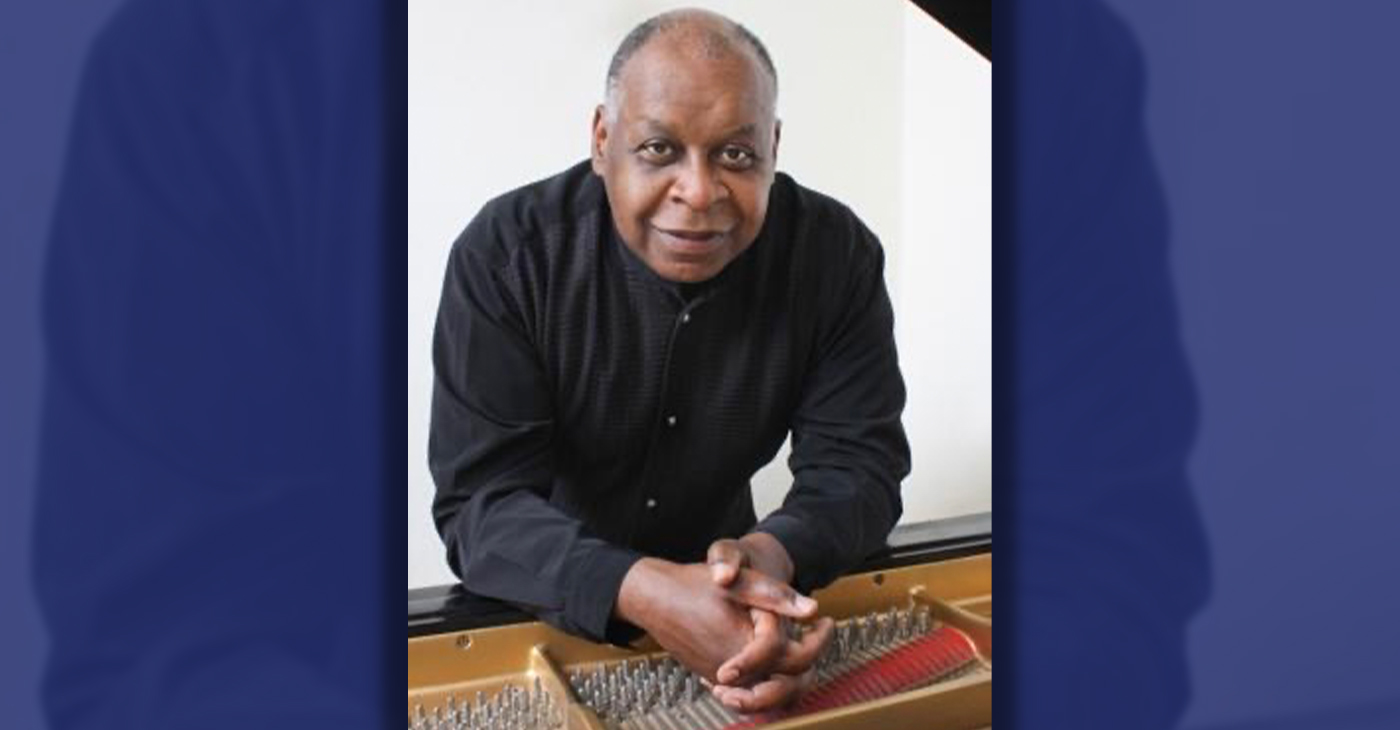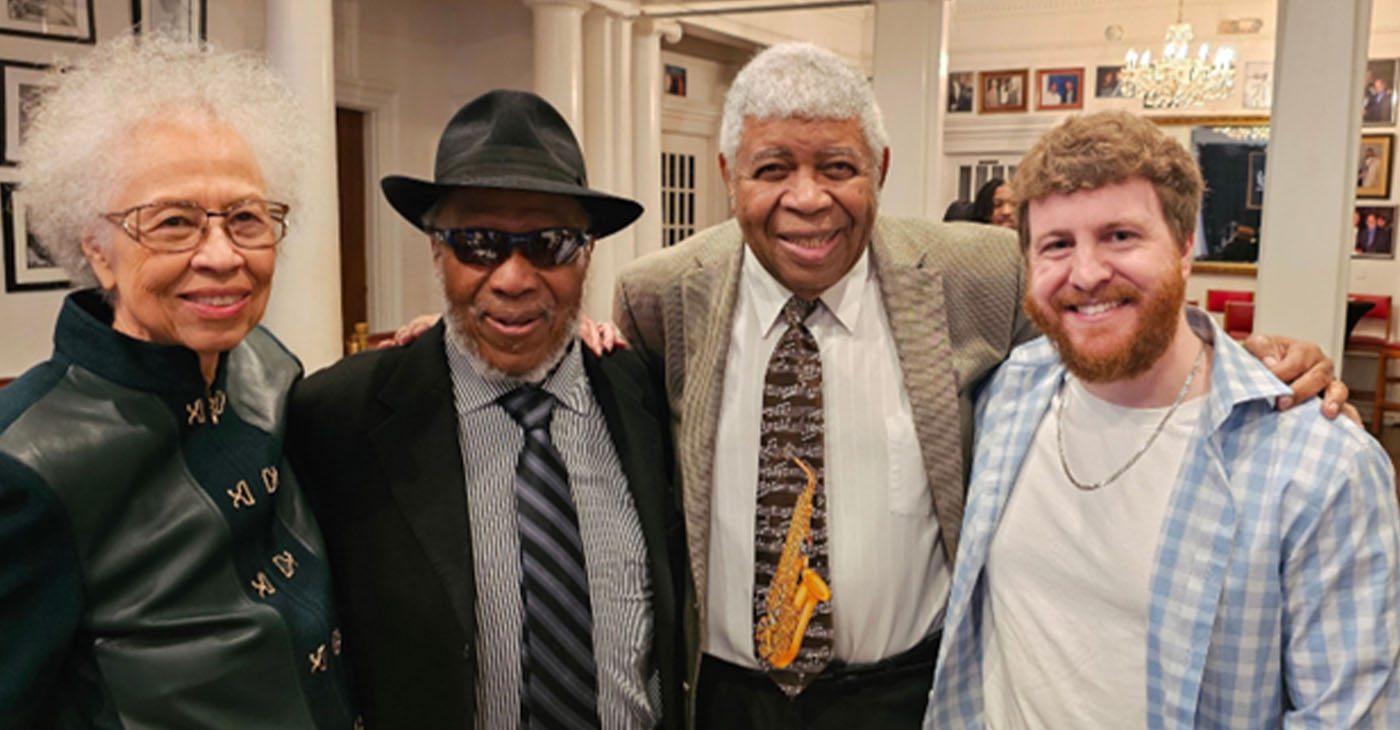Arts and Culture
Jazz Professor’s African Roots Inspire Students
By Arvin Temkar, University of San Francisco
Look no further than the title of USF adjunct professor and alumnus Pascal Bokar Thiam’s latest release Guitar Balafonics for a hint to the album’s unique and creative sound.
As the jazz and blues magazine DownBeat says in its glowing review of the album, “It takes a moment for your ears to adjust and realize that it is, in fact, a guitar producing those stately notes.”
That’s because, Thiam EDD 2006, who was raised in Mali and Senegal, slightly mutes his guitar’s strings with his palm to create a marimba-like sound that emulates the West African percussion instrument the balafon.
The technique gives the American jazz standards featured on Guitar Balafonics a distinctly African vibe.
The album, which DownBeat chose as a best CD of 2015, is, in a way, a reflection of the performing art professor’s work at USF. Thiam, who earned his doctorate in education here, is the author of 2011’s “From Timbuktu to the Mississippi Delta: How West African Standards of Aesthetics Have Shaped the Music of the Delta Blues.”
It chronicles how West African musical aesthetic has influenced mainstream American culture — the banjo, for example, can be traced to a string instrument brought from West Africa in the Atlantic slave trade. In USF classes like Jazz Culture and Social Justice and Survey of African Music, Thiam teaches students how the blues, bluegrass, jazz, and other American music forms were born from these African roots.
“That’s why American music is so different,” he says. “American music has nothing to do with the music of Bach, Mozart, and Beethoven.”
Maggie Gehegan ’12 says Thiam’s class on African music was one of her favorite classes at USF — and it wasn’t even part of her degree.
“It opened up this whole repertoire of music I had never really explored,” says Gehegan, who earned a bachelor of science in nursing at the School of Nursing and Health Professions.
Gehegan’s fond memories of that class contributed to her decision to join a jazz ensemble taught by Thiam. There was only one hitch: She wanted to be a vocalist — but she’d never sung in public before.
Thiam, who doesn’t require auditions for the class, pushed her to practice and improve. He’s brought students to play at his Savannah Jazz Club, where some of the Bay Area’s top musicians perform. The club hosted one of Gehegan’s first live performances.
“It’s easy to perform on campus because your friends are there, but when you walk into a club and people are looking at you — there, you have to produce,” says Thiam. “In some cases they’ve paid an admission fee and they don’t know you. That’s when you realize it’s important to practice.”
Now Gehegan, a nurse living in New Orleans, is also a touring rhythm and blues singer with her first recorded EP.
“I’m playing and performing music in a city that lives and breathes music,” she says. “It’s definitely a testament to the confidence Dr. T instilled in me during my time in his classes.”
Thiam says while he doesn’t expect all of his students to become jazz musicians, he wants them to at least appreciate the art form’s powerful history.
“In order to appreciate music, you have to understand its origins,” he says. “It comes from a culture. It has a story.”
For more information, go to www.usfca.edu/news/jazz-professors-african-roots-inspire-music-students
Arts and Culture
Kedrick Armstrong: New Music Director for the Oakland Symphony
The Oakland Symphony Announced Kedrick Armstrong as its Next Music Director. In addition to conducting the orchestra’s public concerts, Armstrong will also actively participate in the Oakland Symphony’s many education and community engagement programs, designed to inspire a love of music in people of all ages.

By Post Staff
The Oakland Symphony Announced Kedrick Armstrong as its Next Music Director.
In addition to conducting the orchestra’s public concerts, Armstrong will also actively participate in the Oakland Symphony’s many education and community engagement programs, designed to inspire a love of music in people of all ages.
Armstrong is the successor to previous music director and Conductor Michael Morgan, who passed away in 2021 after a 30-year tenure at the Symphony.
Armstrong will open the Oakland Symphony 2024-2025 season on October 18.
Armstrong, who is 29 and hails from Georgetown, South Carolina, is currently the creative partner and principal conductor of the Knox-Galesburg Symphony.
The Chicago Tribune has praised Armstrong for his ability to “simply let the score speak for itself.” He enjoys a wide range of repertoire, spanning early music to premiering new works, using his joy and curiosity for all music to cultivate understanding and collaboration within diverse communities.
“I am deeply honored and grateful for the opportunity to serve as the new music director of the Oakland Symphony,” Armstrong said. “As a Black conductor, I find it humbling to stand on the shoulders of both Michael Morgan and Calvin Simmons,” the most recent and the first African American music directors of the Symphony, respectively.
Armstrong led three programs at the Symphony between 2022 and early 2024, which showcased his broad knowledge of the classical repertoire and enthusiasm for spotlighting diverse voices.
On his Oakland Symphony subscription debut on Feb. 16, Armstrong led the world premiere of “Here I Stand: Paul Robeson,” an oratorio by Carlos Simon on a libretto by Dan Harder, commissioned by the Oakland Symphony.
Armstrong was selected unanimously by the Oakland Symphony’s board of directors and musicians after an extensive two-year search. “The search committee was overwhelmed by Kedrick’s scholarship and curiosity about all kinds of music, from classical and jazz to gospel and hip-hop,” said. Dr. Mieko Hatano, executive director of the Oakland Symphony. “We are thrilled to have him join us at the Oakland Symphony.”
Arts and Culture
Faces Around the Bay Dr. Carl Blake, Pianist
Born in Liberty, Missouri, Carl Blake, a virtuoso and respected pianist, made his most recent migration to the East Bay in 1999. One might have seen him performing recently at Noontime Concerts in San Francisco, or at the Piedmont Center for the Arts in Oakland. He is Director of Music at The Church for the Fellowship of All Peoples in San Francisco. He was also co-organizer and collaborative pianist at Herbst Theater for The Majesty of the Spirituals concert in 2022 and has held several church positions in the Bay Area.

By Barbara Fluhrer
Born in Liberty, Missouri, Carl Blake, a virtuoso and respected pianist, made his most recent migration to the East Bay in 1999.
One might have seen him performing recently at Noontime Concerts in San Francisco, or at the Piedmont Center for the Arts in Oakland. He is Director of Music at The Church for the Fellowship of All Peoples in San Francisco. He was also co-organizer and collaborative pianist at Herbst Theater for The Majesty of the Spirituals concert in 2022 and has held several church positions in the Bay Area.
Blake obtained a Bachelor of Music from Boston University and continued post-baccalaureate studies in Jamaica before earning a Master of Arts in Music at San Jose State University. He was the recipient of two Fulbright residencies in Honduras and completed a third residency at the University of St. Petersburg in Russia. He has a Doctor of Musical Arts from Cornell University.
At age 19, Blake, then an undergraduate piano major at Boston University, was “discovered” by Impresario Dr. W. Hazaiah Williams, who is the Founder and Director of Today’s Artists/Four Seasons Arts.
Williams honored Blake by awarding him the first Marian Anderson Young Artist Award. Anderson personally presented the award at the Masonic Auditorium in S.F. Subsequently, Blake was presented by Dr. Williams in his San Francisco debut at The Herbst Theatre. Williams subsidized a year of study abroad for Blake at the Paris Conservatory of Music. Additionally, Williams sponsored Blake’s New York Weill Hall debut, where he has performed twice since. Blake performed several times at the Yachats Music Festival in Oregon.
Blake continues to perform nationally and abroad. His hobbies are reading, baking and travel. He says, “I’m still pumping ivories, as Belgian pianist Jeanne Stark described the disciplined practice of concert piano.”
Arts and Culture
Oakland Jazz Great Offers Master Class as City Declares “John Handy Day”
World-renowned jazz master saxophonist John Handy, a McClymond’s High School graduate, was presented with a Mayor of Oakland Proclamation declaring Feb. 12, as John Handy Day in the city. Handy is most notably known as the featured saxophonist for Charles Mingus on “Goodbye Pork Pie Hat” from the album “Mingus Ah Um” (1959) and on “Hard Work” from his own album “Hard Work” (1976).

By Conway Jones
World-renowned jazz master saxophonist John Handy, a McClymond’s High School graduate, was presented with a Mayor of Oakland Proclamation declaring Feb. 12, as John Handy Day in the city.
Handy is most notably known as the featured saxophonist for Charles Mingus on “Goodbye Pork Pie Hat” from the album “Mingus Ah Um” (1959) and on “Hard Work” from his own album “Hard Work” (1976).
“John Handy is a jazz icon and an inspiration to musicians everywhere,” said Ayo Brame, a 16-year-old Oakland tenor saxophone player who is enrolled at the Oakland School for the Arts.
In celebration of this day, the reception in downtown Oakland at Geoffrey’s Inner Circle was a gathering of artists, young and old, coming together in his honor and celebrating his 91st birthday.
Handy presented a Saxophone Colossus free masterclass for musicians. This class afforded a rare opportunity to learn about the saxophone from an aficionado. The class was free and open to all – saxophonists, vocalists, aficionados, students, and casual listeners.
“As a longtime friend for over 60 years, and fellow musician who has had numerous opportunities to share the stage with John, it has always been a pleasure performing with him and hearing his creative interpretations of the music and his gift of ease inspiring the next generation of jazz musicians,” said Roger Glenn, a multi-instrumentalist.
-

 Activism4 weeks ago
Activism4 weeks agoOakland Post: Week of March 27 – April 2, 2024
-

 #NNPA BlackPress4 weeks ago
#NNPA BlackPress4 weeks agoCOMMENTARY: D.C. Crime Bill Fails to Address Root Causes of Violence and Incarceration
-

 #NNPA BlackPress4 weeks ago
#NNPA BlackPress4 weeks agoFrom Raids to Revelations: The Dark Turn in Sean ‘Diddy’ Combs’ Saga
-

 #NNPA BlackPress4 weeks ago
#NNPA BlackPress4 weeks agoCOMMENTARY: Lady Day and The Lights!
-

 #NNPA BlackPress4 weeks ago
#NNPA BlackPress4 weeks agoMayor, City Council President React to May 31 Closing of Birmingham-Southern College
-

 #NNPA BlackPress4 weeks ago
#NNPA BlackPress4 weeks agoBaltimore Key Bridge Catastrophe: A City’s Heartbreak and a Nation’s Alarm
-

 #NNPA BlackPress4 weeks ago
#NNPA BlackPress4 weeks agoBaltimore’s Key Bridge Struck by Ship, Collapses into Water
-

 #NNPA BlackPress4 weeks ago
#NNPA BlackPress4 weeks agoBeloved Actor and Activist Louis Cameron Gossett Jr. Dies at 87









































